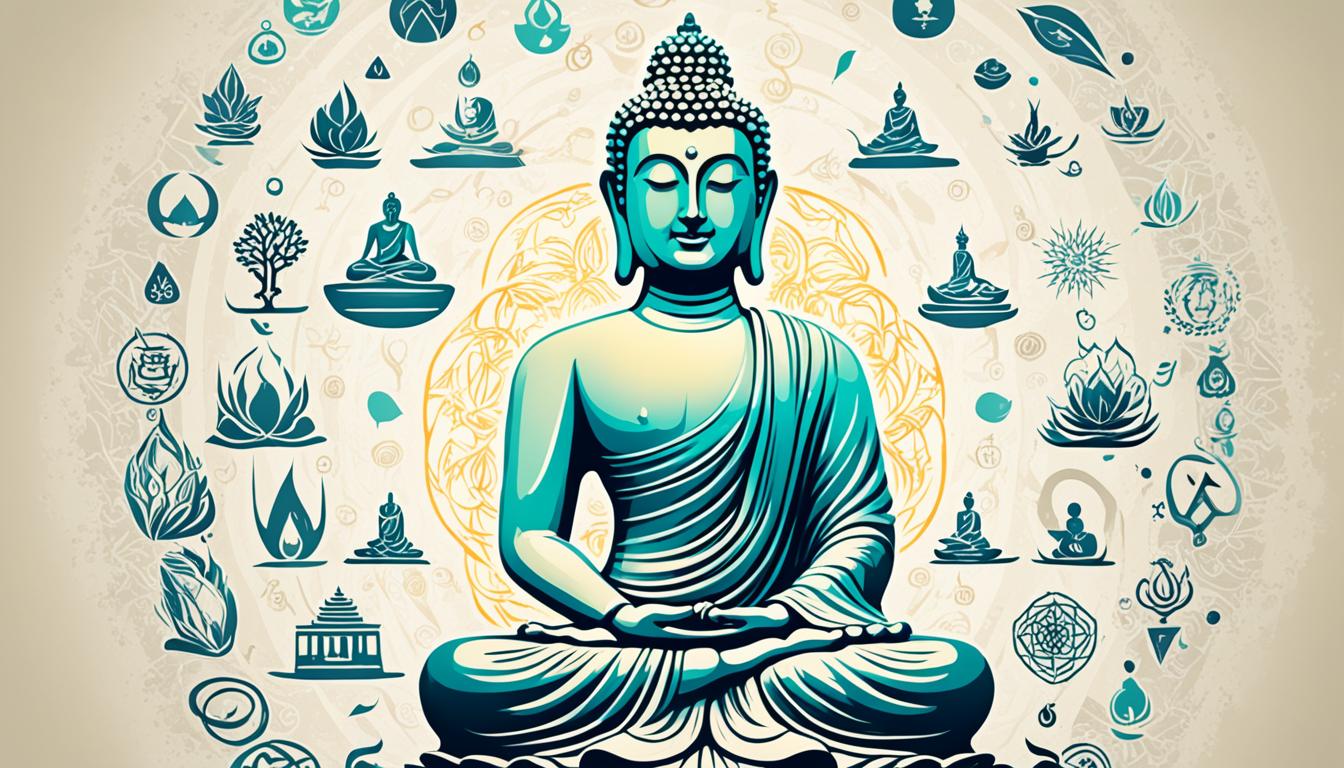When it comes to Buddhism, are we talking about a religion or a philosophy? This question has intrigued scholars, believers, and skeptics alike. Is Buddhism a spiritual path or simply a way of thinking? Let’s delve into the world of Buddhism to uncover its true nature and shed light on its values.
Buddhism is a major world religion, with over 507 million followers globally. Originating in India in the 6th century BC, it was founded by Siddhartha Gautama, also known as Buddha. While Buddhism is often referred to as a philosophy, especially in Western cultures, due to its emphasis on practical teachings and philosophical inquiry, it is also considered a religion due to its beliefs in karma, rebirth, and the pursuit of enlightenment.
But what sets Buddhism apart? Is it solely a spiritual endeavor or does it encompass broader philosophical dimensions? Join us as we journey through the various aspects of Buddhism and explore the values it imparts.
Key Takeaways:
- Buddhism is a major world religion with over 507 million followers.
- It originated in India in the 6th century BC and was founded by Siddhartha Gautama, also known as Buddha.
- While Buddhism is often referred to as a philosophy, it is also considered a religion due to its beliefs in karma, rebirth, and the pursuit of enlightenment.
- Buddhism offers unique insights into mindfulness, compassion, and personal growth.
- Exploring Buddhism’s religious and philosophical aspects can provide a deeper understanding of this profound tradition.
The Teachings of Buddhism
The teachings of Buddhism revolve around the Four Noble Truths and the Eightfold Path. These fundamental principles outline the path to liberation from suffering and the attainment of enlightenment.
The Four Noble Truths
The first and foundational teaching in Buddhism is the Four Noble Truths. They were originally taught by Buddha in his first sermon after attaining enlightenment. The Four Noble Truths are as follows:
- Dukkha (Suffering): Life is filled with suffering and dissatisfaction. This suffering can be caused by physical pain, mental anguish, and even the dissatisfaction that arises from unfulfilled desires.
- Samudaya (Cause of Suffering): The root cause of suffering is attachment and craving. Our desires for material possessions, power, and sensory pleasures lead to suffering, as they are impermanent and cannot provide lasting happiness.
- Nirodha (Cessation of Suffering): It is possible to attain the cessation of suffering by letting go of attachment and craving. This state, known as Nirvana, is the ultimate goal in Buddhism.
- Magga (Path to the Cessation of Suffering): The Eightfold Path provides a set of guidelines for living a moral, mindful, and purposeful life, leading to the cessation of suffering and the realization of enlightenment.
The Eightfold Path
The Eightfold Path is the practical framework through which Buddhists strive to achieve liberation from suffering. It consists of eight interconnected principles or practices:
- Right View: Understanding and perceiving the world correctly, including the nature of suffering, impermanence, and the interconnectedness of all things.
- Right Intention: Cultivating wholesome intentions and attitudes, such as renouncing harmful desires and promoting loving-kindness and compassion.
- Right Speech: Speaking truthfully, avoiding harmful or divisive speech, and using words to bring about harmony and understanding.
- Right Action: Engaging in ethical behavior by refraining from harming living beings, stealing, or engaging in sexual misconduct.
- Right Livelihood: Earning a living through ethical means and avoiding occupations that cause harm or contribute to suffering.
- Right Effort: Cultivating the effort to develop positive qualities, abandon negative habits, and cultivate mindfulness and concentration.
- Right Mindfulness: Being fully present and aware of one’s thoughts, feelings, and bodily sensations without judgment or attachment.
- Right Concentration: Cultivating deep states of concentration and focus through practices such as meditation, leading to insight and liberation.
The teachings of Buddhism provide individuals with practical guidance on how to live a meaningful and fulfilling life. By understanding the Four Noble Truths and following the Eightfold Path, Buddhists aim to alleviate suffering, cultivate wisdom, and ultimately attain enlightenment.

Buddha’s Philosophy and Critical Thinking
Buddha’s teachings go beyond traditional religious practices, incorporating a philosophical approach that emphasizes logical reasoning and critical thinking. Unlike many other religions that promote blind faith and unquestioning acceptance of scripture, Buddhism encourages its followers to question, investigate, and test the teachings for themselves. This unique aspect of Buddhism challenges the notion of religion as a system based solely on belief and instead promotes personal inquiry and intellectual exploration.
The teachings of Buddha are rooted in the belief that individuals have the capacity to develop their own understanding of truth through direct experience and observation. Buddha himself famously said, “Do not believe in anything simply because you have heard it. Do not believe in anything simply because it is spoken and rumored by many. Do not believe in anything simply because it is found written in your religious books. Do not believe in anything merely on the authority of your teachers and elders. Do not believe in traditions because they have been handed down for many generations. But after observation and analysis, when you find that anything agrees with reason and is conducive to the good and benefit of one and all, then accept it and live up to it.”
The emphasis on critical thinking and personal investigation has led to Buddhism being recognized as more than just a religion. The philosophical aspect of Buddha’s teachings offers a framework for analyzing and understanding the nature of existence and the pursuit of happiness. It has inspired generations of scholars, philosophers, and seekers of truth to engage in deep introspection and dialogue about the nature of reality and the human experience.
Moreover, Buddhism’s promotion of critical thinking has fostered the development of different philosophical schools within the tradition. These schools have explored various interpretations of Buddha’s teachings, engaging in rigorous debates on concepts such as selflessness, consciousness, and the nature of suffering. This intellectual diversity further showcases the philosophical nature of Buddhism and its focus on independent thought and inquiry.
In the context of religious practices and beliefs, Buddha’s philosophy may challenge conventional understandings. While it incorporates spiritual elements, Buddhism’s emphasis on critical thinking and direct experience sets it apart from many traditional religious systems. By elevating personal insight and understanding, Buddhism offers individuals the opportunity to develop their own relationship with reality and the transcendent.

Whether viewed as a religion, a philosophy, or both, Buddhism continues to shape the lives of millions around the world. It provides a path for spiritual growth, personal development, and the exploration of profound existential questions. The incorporation of critical thinking and philosophical inquiry sets Buddhism apart, offering seekers the opportunity to engage thoughtfully with the teachings of Buddha.
The Religious Aspects of Buddhism
While Buddhism is often regarded as a philosophy, it also incorporates several religious elements. Buddhists believe in the concepts of reincarnation and karma, which suggest that one’s actions in past lives determine their future rebirths. These beliefs infuse the practice of Buddhism with a sense of spirituality and a commitment to personal growth.
In addition to its philosophical teachings, Buddhism encompasses a wide array of rituals, ceremonies, and devotional practices. These rituals, such as making offerings and meditating, play a prominent role in worship and are seen as a way to express gratitude for the teachings of Buddha. These religious practices provide a sense of connection to something greater than oneself and aid in personal transformation.
Nirvana, the ultimate goal in Buddhism, is considered a sacred state of liberation from the cycle of suffering and rebirth. Attaining Nirvana is seen as the culmination of one’s spiritual journey and marks the end of the cycle of reincarnation. It represents the ultimate fulfillment and enlightenment that Buddhists strive for in their religious practice.
The Holy Book of Buddhism: The Tripitaka
One of the foundational texts of Buddhism is the Tripitaka, also known as the “Three Baskets.” It is considered the holy scripture of Buddhism and contains the teachings and discourses of Buddha. The Tripitaka is divided into three sections: the Vinaya Pitaka (rules for monastic discipline), the Sutta Pitaka (discourses of Buddha), and the Abhidhamma Pitaka (analytical and philosophical interpretations).

A Visual Overview of Buddhism’s Religious Aspects
| Religious Aspects | Characteristics |
|---|---|
| Belief in Reincarnation and Karma | An understanding that actions in past lives determine future rebirths and the role of karma in shaping one’s destiny. |
| Rituals and Ceremonies | Engaging in various practices such as making offerings, meditation, and participating in ceremonies to express devotion and gratitude. |
| Ultimate Goal: Nirvana | Striving for liberation from the cycle of suffering and rebirth, reaching a state of complete enlightenment. |
| The Tripitaka | The sacred scripture of Buddhism, containing the teachings and discourses of Buddha. |
Through its religious aspects, Buddhism provides a framework for individuals to explore their spiritual nature and find meaning in their lives. This combination of philosophy and religion offers a unique path towards personal growth, enlightenment, and the pursuit of inner peace.
Conclusion
Buddhism is a profound and multifaceted tradition that encompasses both religious and philosophical dimensions. Its teachings offer invaluable insights into achieving personal and societal harmony through practices such as mindfulness, compassion, and the pursuit of enlightenment.
While Buddhism shares philosophical aspects with other schools of thought, it sets itself apart by incorporating religious elements such as rituals, devotion, and the belief in rebirth. These aspects enhance the spiritual experience and provide a framework for worshiping and expressing gratitude for Buddha’s teachings.
The classification of Buddhism as a religion or philosophy ultimately depends on individual perspectives and interpretations. Some may view it primarily as a religion due to its belief in karma, rebirth, and the ultimate goal of achieving nirvana. Others may emphasize its philosophical teachings and see it as a path to self-discovery and personal growth.
Regardless of the classification, one thing remains certain: Buddhism continues to have a profound impact on the lives of millions of people worldwide. Its emphasis on compassion, mindfulness, and spiritual growth resonates with individuals seeking a deeper understanding of themselves and the world around them.
FAQ
What are the five important virtues of Buddhism?
The five important virtues of Buddhism are generosity, morality, patience, effort, and wisdom.
What are the teachings of Buddhism?
The teachings of Buddhism revolve around the Four Noble Truths and the Eightfold Path.
Why is Buddhism considered a philosophy and not a religion?
Buddhism is often considered a philosophy due to its emphasis on practical teachings and philosophical inquiry.
What are the religious aspects of Buddhism?
Buddhism incorporates religious elements such as rituals, ceremonies, and devotional practices.
Is Buddhism a spiritual practice?
Yes, Buddhism is considered a spiritual practice that offers unique insights into personal and societal harmony.
Is there a holy book in Buddhism?
Buddhism does not have a single holy book, but rather a large collection of scriptures known as the Tripitaka or the Pali Canon.
What is the fundamental doctrine of Buddhism known as?
The fundamental doctrine of Buddhism is known as the Four Noble Truths.
Why is Buddhism considered a religion and not just a philosophy?
Buddhism is considered a religion because it incorporates beliefs in karma, rebirth, and the goal of attaining enlightenment.
What is the ultimate goal in Buddhism?
The ultimate goal in Buddhism is nirvana, which represents liberation from the cycle of suffering and rebirth.
Can Buddhism be categorized as both a religion and a philosophy?
Yes, Buddhism can be seen as both a religion and a philosophy, depending on individual perspectives and interpretations.

